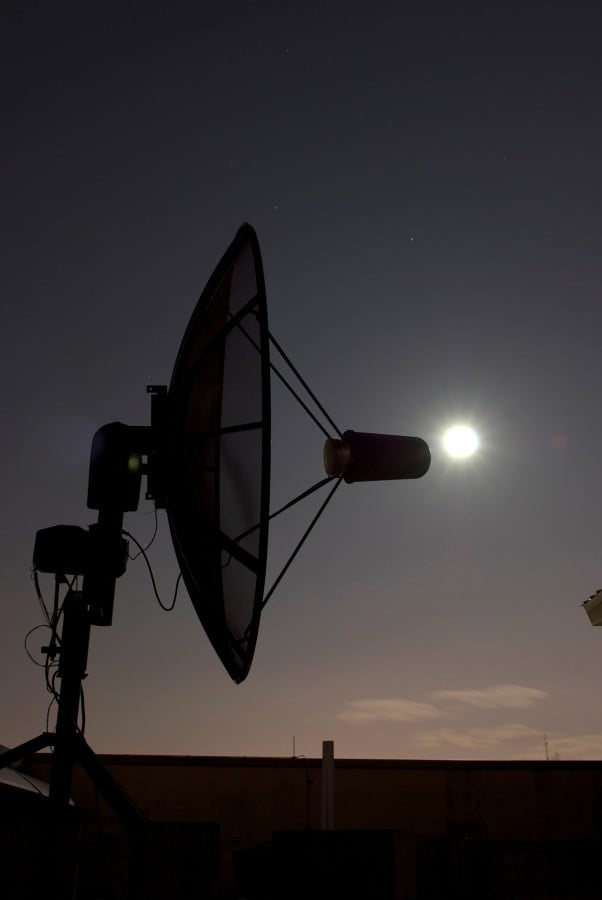With a prize of $1,000 on the line, 10 students work furiously to polish their projects to perfection before the judging is finished. This isn’t a new game show — this is the GUS Challenge, and it’s happening now.
Officially titled the Principled Problem Solving Guilford Undergraduate Symposium Small Group Project Challenge, the competition involves three groups of students who have researched, designed, and implemented projects to improve Guilford and Greensboro. Now, the groups will present their projects — “Access Everywhere: Handicap Accessibility on Guilford Campus,” “Reaching out to the Stars and the Community using Radio Astronomy,” and “Rooting Ourselves in Greensboro: Guilford’s Student-Organized Alternative Fall Break Trip” — at GUS.
Kim Yarbray, project and communication manager for the Center for Principled Problem Solving, said that the GUS Challenge is the culmination of months of work. Students submitted proposals for the challenge in the fall of 2010, but one group started working earlier.
“We started our project in the fall of 2009,” said senior Amelia McLaughlin. “We had to do a project involving the core values for our class, and we came up with ‘Access Everywhere.’ Then we were all really invested in this project, and we just couldn’t stop working on it.”
“Access Everywhere” brings attention to the fact that at Guilford, many locations are not accessible to those with disabilities.
McLaughlin and fellow group members junior Darius Verdell and senior Reid Perkins sought to both raise awareness and offer solutions to the problem.
“Last spring we presented at GUS and a couple other places, and in the fall we had ‘Access Everywhere Week,'” said Perkins. “In our presentations, we laid out some things that needed to change to make Guilford more accessible.”
The group realized that the 400 people at Guilford with registered disabilities are at a disadvantage, with issues including limited access to many campus buildings.
Through their project and presentations, Perkins, McLaughlin, and Verdell are working to encourage change at Guilford.
“Rooting Ourselves in Greensboro” has also implemented change in the greater Greensboro community. Alyzza Callahan ‘10, seniors Chesapeake First and Courtney Mandeville, and junior Hannah Swenson, planned a week-long exploration of service in Greensboro for fall break 2010.
“We started out hoping to organize a sustainability-themed conference to reach out to the Greensboro community and incorporate this year’s theme of sustainability,” said First. “That turned out to be bigger in scale than what we could reasonably handle, so we decided to keep it simple.”
The group ended up with an alternative fall break experience that addressed the question, “what does service look like in Greensboro?” A conglomeration of traditional, Early College, and CCE students worked on various service projects around Greensboro centered on homelessness and hunger.
“It was really great to get this group of very different people all working toward a common goal,” said First. “Working, cooking, and eating together led to discussions about the bigger issues that affect us all. It really brought us all together.”
The “Access Everywhere” and “Rooting Ourselves in Greensboro” projects had the benefits of being worked on by PPS scholars. “Reaching Out to the Stars” was the only one conceived of and brought to fruition without a PPS scholar’s involvement. In fact, the project did not even start out under the auspices of CPPS.
According to junior Graham Bryden, “Reaching Out to the Stars” began after he had been working the radio telescope with Assistant Professor of Physics Don Smith for some time. Smith suggested to Bryden the option of turning his research into a PPS project. Senior Mel Corbett and junior Garrett Tanner joined Bryden, and the project was born.
“Originally this was just me doing astronomy,” said Bryden. “When it became a PPS project and everyone else came on board, we decided to make our contribution to the community via physical science education.”
With the goal of improving physical science education, the group’s work has focused on teaching science at Guilford Middle School every week.
“We’re showing the students that we can see the structure of the galaxy using radio astronomy,” said Bryden. “It’s really cool.”
“We don’t give kids enough credit,” said Corbett. “They’re actually way smarter than you think, and they ask the best questions. It’s better for them to learn now than later.”
Other projects than these three are supported by CPPS, but only these are competing for the $1,000 prize of the GUS Challenge. The prize is not the point, however, according to First.
“It would be nice to win, but that’s not why we did it,” said First. “Each of the groups has done something that helps the community.”
The three projects competing in the GUS challenge explore different aspects of CPPS’s goal of making the world a better place.
“The mission is to put our core values to work in the world,” said Yarbray. “Each group engages in an issue that matters to them. Problems have interlocking parts. They aren’t solved through direct routes, they’re solved through community involvement and understanding.”

